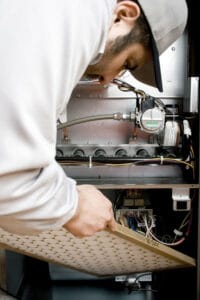
Most homes in Englewood, NJ and surrounding cities use forced-air furnaces for their heat. The air is warmed in the furnace itself, and then distributed through your home via the same system of ducts that carries cool air from your AC in the summer. It’s a simple and effective system, but like any other piece of technology, it can run into trouble from time to time.
Luckily, most of the signs are easy to spot, and while only trained technicians can properly diagnose a problem, you can certainly tell that something is amiss when the heat levels coming out of the air in your vents are not as high as you expect. That means your furnace will need to work harder to do its job, raising your monthly bills and the risk of larger breakdowns in equal measures. The causes can be numerous, which is one of the reasons you need a professional to fix it. But it can include any one of the following:
- Clogged Burners. Dust, dirt and grit can gum up the heads of the burners, especially over a long summer when the furnace sits unused. For obvious reasons, that means less heat is available when you turn your furnace on.
- Duct Breaches. A breach in your ducts somewhere will either pull heated air out of the ducts or pull cold unconditioned air in.
- Clogged Gas Lines. A clog in the gas line causes the same kind of trouble that a clogged burner does: lowering the fuel and reducing the heat in equal measures.
- Overheating. In the event of a clogged filter or similar obstruction, hot air will back up into the furnace. Depending on the system, it may shut off one or more burners to prevent other components from overheating. In these cases, the lower heat levels are often accompanied by a reduced amount of air flow.
How To Avoid Furnace Repairs
Ultimately, the best case scenario is that you don’t experience low heat levels with your furnace. While you can’t always avoid repairs, there is plenty you can do to keep your furnace running well, longer.
Schedule Maintenance
This is our number one piece of advice for anyone hoping to avoid a sudden heating system breakdown. Your heater may be spared from repairs for the rest of the season when you schedule heating maintenance early on (preferably in the fall). In fact, few things can improve the performance of your heater more than a timely maintenance session, which addresses all those little issues too small to merit a heating repair call on their own.
Technicians make adjustments to your system, like cleaning burners and adjusting pressure settings. They check for any potential problems that exist within your heater, so you can get these taken care of before temperatures drop too much. All of this helps your furnace run more smoothly, with a much smaller chance of a sudden system breakdown. When applied on a yearly basis over time, it can even extend the lifetime of your heater.
Change Your Filters
Professional maintenance only happens once a year, but technicians recommend you change your air filter every 1-3 months. Neglecting to change the filter can result in big trouble for your heater. That means it’s not worth waiting until a technician checks your heating system before completing this maintenance task.
Don’t Overwork Your Furnace
When you turn the temperature up higher than you need, it doesn’t actually make the heater work faster. It only forces it to run for longer, heat the home more than you need, and use up energy. Worst of all, your heating system may work so hard that its lifespan is slowly reduced as the parts wear down far more than they should.
Take it easy on your thermostat! Program efficient but comfortable temperatures ahead of time with your programmable thermostat so that you’re always comfortable when you arrive home on a cold evening. Consider using a Wi-Fi thermostat to help your heater run even more efficiently, and monitor it while you are away from home.
Oil to Gas Conversions
If you’re using an old oil-fed boiler system, you’re wasting a lot of energy on an outdated and inefficient fuel system. Converting the boiler to use natural gas is an excellent way to not only save a lot of money on monthly costs, but to be more environmentally friendly as well. Tax rebates and other benefits can make the process much more affordable, and getting an oil-to-gas conversion today can allow you to enjoy the savings all winter long.
Call BZ Dependable to perform heating repairs today!

